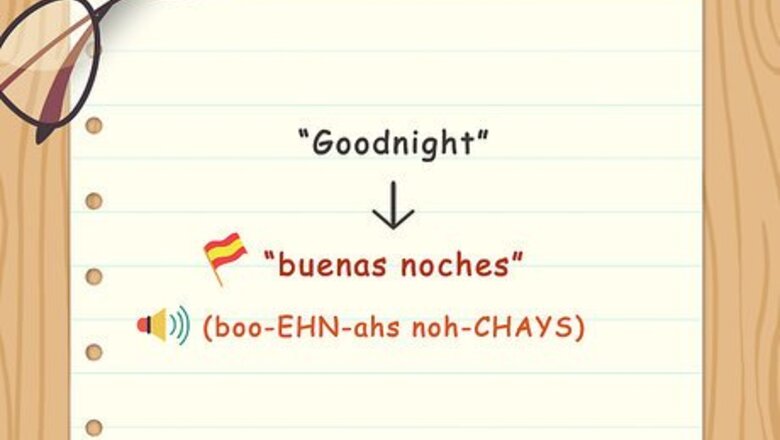
views
X
Research source
But in Spanish, just as in English, there are other phrases you can use to greet people in the evening, depending on the situation. There are even more phrases you can use if you're talking to children, or to close friends or relatives.[2]
X
Research source
Greeting Someone in the Evening
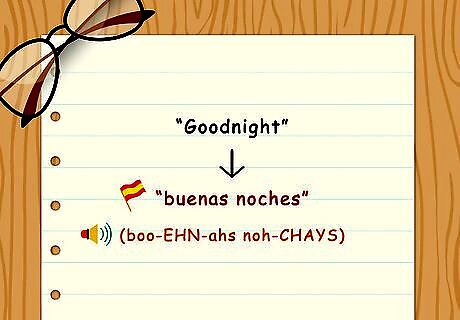
Say "buenas noches" (boo-EHN-ahs noh-CHAYS). "Buenas" is derived from the adjective "bueno," and "noches" is the plural form for the feminine noun meaning "night." Together they are used similarly to "good evening" in English. Since there's no verb in the phrase, it doesn't change regardless of who you're addressing. "Buenas noches" can be used either as a greeting or a farewell, as long as it's dark out. However, it's more commonly used as a greeting.
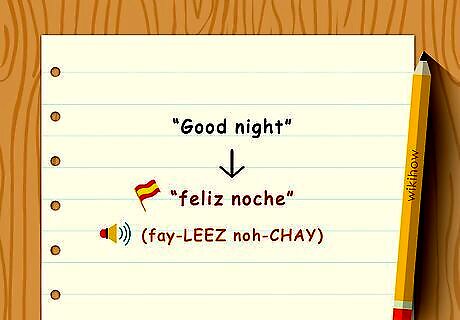
Use "feliz noche" (fay-LEEZ noh-CHAY) as a farewell in more formal situations. Translated literally, this phrase means "happy night," but it is used in the same way you would say "goodnight" in English. This is considered a polite evening farewell. For example, if you were meeting your in-laws for the first time, you might say "feliz noche" to them as you were parting ways. Another polite farewell to use late in the evening is "que tengan buena noche" (kay tehn-GEHN boo-EHN-ah noh-CHAY), which means "have a good night."
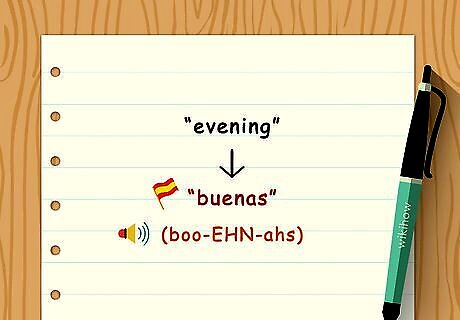
Shorten your greeting to "buenas." Just as you might say "evening" instead of "good evening" in English, you can use "buenas" to mean "buenas noches." Since this short form doesn't indicate a time of day, you can use it anytime, although it's more frequently used in the afternoon and evening.
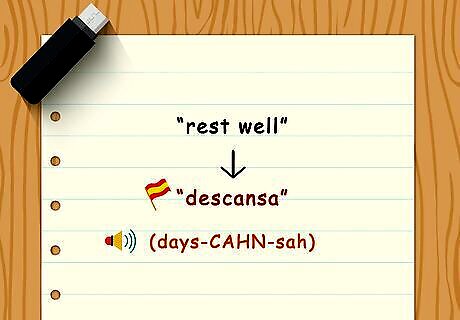
Use "descansa" (days-CAHN-sah) at the end of the evening. The word descansa is taken from the verb descansar, and basically means "rest." In casual situations, you can say this as a way to say goodnight, especially if it's late and everyone is headed home for bed. If you're saying farewell to a group of people, say (vosotros) "descansad" or (ustedes) "descansen," depending on your level of familiarity with the people and the customs of the country. This is a more casual farewell, typically used when you're on more familiar terms with the people you're addressing.
Wishing Someone a Good Night
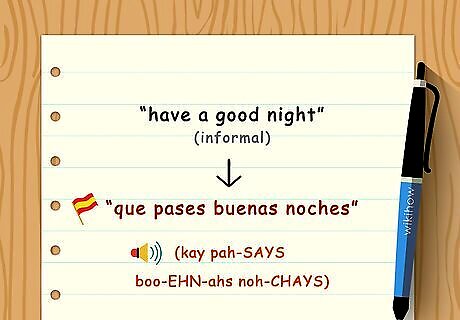
Say "que pases buenas noches" (kay pah-SAYS boo-EHN-ahs noh-CHAYS). This phrase is a friendly command to pass or spend a good night. In this form of the phrase, the verb pasar is conjugated informally. Use this conjugation when you're speaking to children, or to friends and family members with whom you're on familiar, casual terms.
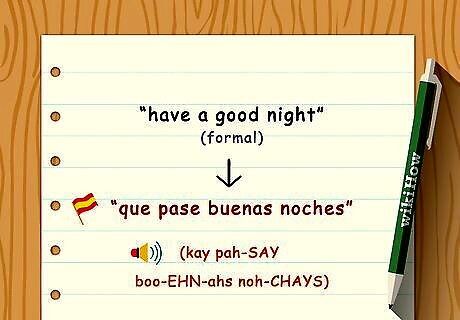
Use "que pase buenas noches" (kays pah-SAY boo-EHN-ahs noh-CHAYS ooh-STEHD) in more formal settings. If you're speaking with someone who is older than you, or holds some position of authority, you want to use the formal pronoun usted when wishing them a good night. This would also be the form to use if you're talking to someone you don't know very well, such as a shop clerk or a friend of a friend who you've just met. If you're speaking to a group of people, say "que pasen buenas noches (ustedes)."
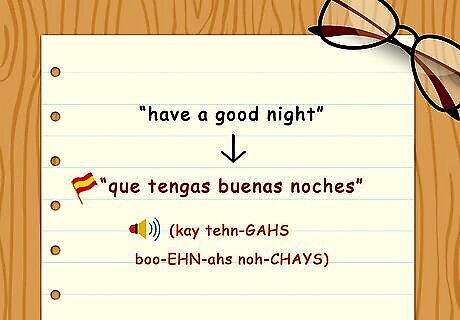
Try tener instead of pasar. You can also use the conjugated form of the verb tener, which means "to have," to tell someone to have a good night. With this verb, the phrase would be "que tengas buenas noches" (kay tehn-GAHS boo-EHN-ahs noh-CHAYS). Formally, the phrase is "que tenga buenas noches." The plural is "que tengan buenas noches." In normal conversation, people typically don't include the pronoun "usted."
Sending Someone to Bed
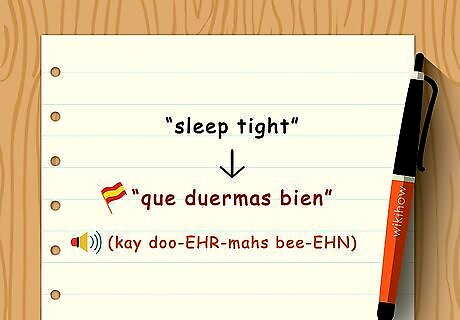
Say "que duermas bien" (kay doo-EHR-mahs bee-EHN). This phrase is a polite command that translates to "sleep well." Use it primarily with children, family, and close friends. Conjugate the verb dormir depending on the person you're addressing. Tú: "Que duermas bien." Usted: "Que duerma bien." Vosotros: "Que durmáis bien." Ustedes: "Que duerman bien."
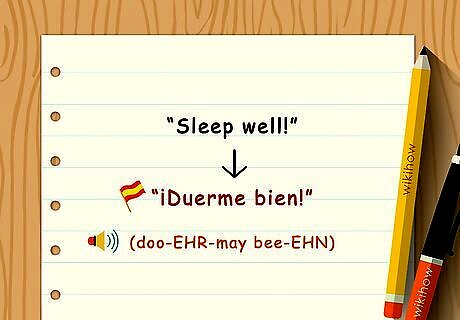
Use the command "duerme bien" (doo-EHR-may bee-EHN). Particularly if you're telling someone to "sleep well" and intend it more as an instruction (for example to a child), this phrase is appropriate. Tú: "¡Duerme bien!" Usted: "¡Duerma bien!" Ustedes: "¡Duerman bien!"
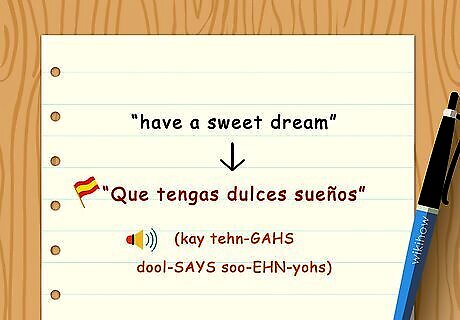
Wish someone "Que tengas dulces sueños" (kay tehn-GAHS dool-SAYS soo-EHN-yohs). This phrase is used to mean "sweet dreams," although the literal translation is something like "that you might have sweet dreams." This phrase typically is only used for children – occasionally for younger siblings or significant others. Since the phrase is only used familiarly, you only need the familiar conjugations of the verb tener. Use tengas if you're addressing one person, and tengáis if you're addressing several people. You also can shorten the phrase and simply say "dulces sueños," or "sweet dreams."
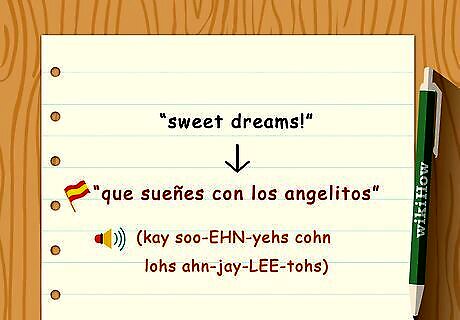
Try "que sueñes con los angelitos" (kay soo-EHN-yehs cohn lohs ahn-jay-LEE-tohs). This phrase, typically only used with children, means "dream with the little angels." This phrase uses the verb soñar ("to dream"), which is conjugated irregularly. However, since it's only used for children, the familiar conjugations are the only ones you need to know: sueñes (singular) and soñéis" (plural). You can also say this in the command form: "Sueña con los angelitos."




















Comments
0 comment